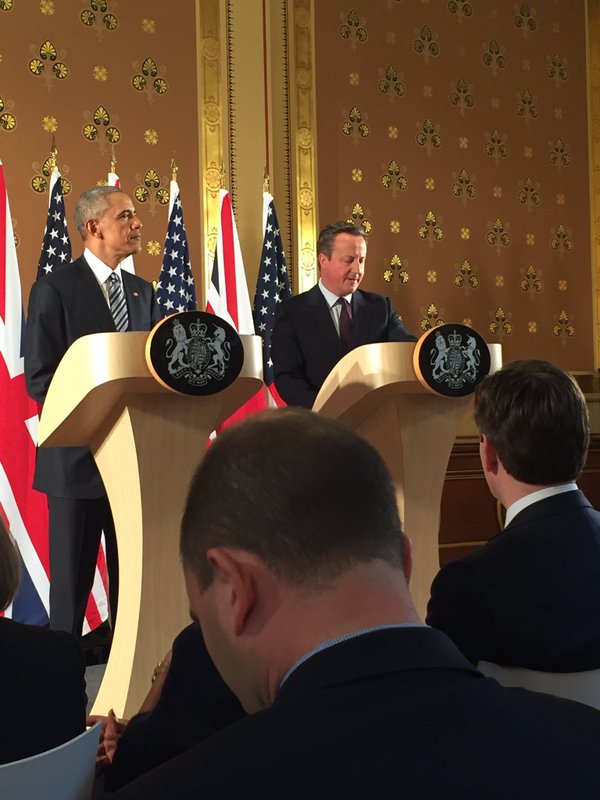President Barack Obama on the UK future in the EU:
“This is a decision for the people of the United Kingdom to make. I’m not coming here to fix any votes. I’m not casting a vote myself. I’m offering my opinion. And in democracies, everybody should want more information, not less. And you shouldn’t be afraid to hear an argument being made. That’s not a threat. That should enhance the debate.
Particularly because my understanding is that some of the folks on the other side have been ascribing to the United States certain actions we’ll take if the UK does leave the EU. So they say, for example, that, well, we’ll just cut our own trade deals with the United States. So they’re voicing an opinion about what the United States is going to do. I figured you might want to hear it from the President of the United States what I think the United States is going to do. (Laughter.)
And on that matter, for example, I think it’s fair to say that maybe some point down the line, there might be a UK-U.S. trade agreement, but it’s not going to happen anytime soon, because our focus is in negotiating with a big bloc, the European Union, to get a trade agreement done, and the UK is going to be in the back of the queue — not because we don’t have a special relationship, but because, given the heavy lift on any trade agreement, us having access to a big market with a lot of countries — rather than trying to do piecemeal trade agreements is hugely inefficient.
Now, to the subject at hand, obviously the United States is in a different hemisphere, different circumstances, has different sets of relationships with its neighbors than the UK does. But I can tell you this. If, right now, I’ve got access to a massive market where I sell 44 percent of my exports, and now I’m thinking about leaving the organization that gives me access to that market and that is responsible for millions of jobs in my country and responsible for an enormous amount of commerce and upon which a lot of businesses depend, that’s not something I’d probably do.
And what I’m trying to describe is a broader principle, which is, in our own ways — I mean, we don’t have a common market in the Americas — but in all sorts of ways, the United States constrains itself in order to bind everyone under a common set of norms and rules that makes everybody more prosperous.
That’s what we built after World War II. The United States and the UK designed a set of institutions — whether it was the United Nations, or the Bretton Woods structure, IMF, World Bank, NATO, across the board. Now, that, to some degree, constrained our freedom to operate. It meant that occasionally we had to deal with some bureaucracy. It meant that on occasion we have to persuade other countries, and we don’t get 100 percent of what we want in each case. But we knew that by doing so, everybody was going to be better off — partly because the norms and rules that were put in place were reflective of what we believe. If there were more free markets around the world, and an orderly financial system, we knew we could operate in that environment. If we had collective defense treaties through NATO, we understood that we could formalize an architecture that would deter aggression, rather than us having, piecemeal, to put together alliances to defeat aggression after it already started. And that principle is what’s at stake here.
And the last point I’ll make on this — until I get the next question, I suspect — (laughter) — is that, as David said, this magnifies the power of the UK. It doesn’t diminish it. On just about every issue, what happens in Europe is going to have an impact here. And what happens in Europe is going to have an impact in the United States.
We just discussed, for example, the refugee and the migration crisis. And I’ve told my team — which is sitting right here, so they’ll vouch for me — that we consider it a major national security issue that you have uncontrolled migration into Europe — not because these folks are coming to the United States, but because if it destabilizes Europe, our largest trading bloc — trading partner — it’s going to be bad for our economy. If you start seeing divisions in Europe, that weakens NATO. That will have an impact on our collective security.
Now, if, in fact, I want somebody who’s smart and common sense, and tough, and is thinking, as I do, in the conversations about how migration is going to be handled, somebody who also has a sense of compassion, and recognizes that immigration can enhance, when done properly, the assets of a country, and not just diminish them, I want David Cameron in the conversation. Just as I want him in the conversation when we’re having discussions about information-sharing and counterterrorism activity. Precisely because I have confidence in the UK, and I know that if we’re not working effectively with Paris or Brussels, then those attacks are going to migrate to the United States and to London, I want one of my strongest partners in that conversation. So it enhances the special relationship. It doesn’t diminish it.”


